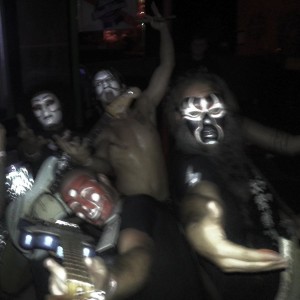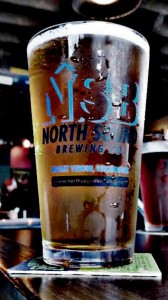fiction by Jason Edwards
43 year old Bran Downson sits in a home office, stabbing furiously at a keyboard. His biggest fear: that a great white shark will come bursting through this office window, and devour him whole. Its steely teeth like knives stabbing into him as he’s rendered into so much pulp. An irrational fear, to be sure, and yet what fears are not rational in the face of the truths of existentialism? That we are, all of us, disconnected entities afloat in a meaningless, hostile universe, a bittersweet knowledge that only serves to make a democracy of the great human fearscape, and the only terror that compels you are the ones you’ve voted to a place of leadership? Bran Downson is also scared of spiders.
***
Corrupt Law Enforcement Officer Clancy Thompson grips with steely fingers the steering wheel of a Mark IV Ryan-Class Aquato-Ride tanker-transport utility vehicle. Traffic is superb on I-5 today, flowing like the tresses of an ethnically ambiguous woman dangerously but only morally and not legally close to the age of consent. His biggest fear: that the great white shark swimming in the hold of his tanker-transport will not do the job when Clancy has it flung through the upper-floor home office window of his next target. An irrational fear, to be sure, considering the 15 years of training under his belt, the ten thousand hours of practice in performing this particular operation, and the solid-gold crucifix he wears under his vibra-tech bullet and taser and naughty-glances proof vest, proof that God Himself is on his side. Still, operations like these, unnecessarily complicated for the sake of an outlandish and therefore entertaining plot, are too oft wrought with unforeseeables. To take his mind off of it, Clancy Thompson thinks about his favorite Eagles song.
***
He seems to cling to the steely girders like a june bug on tree bark in the syrupy warmth of a Kansas July. His back hovers above the racing asphalt, a black unspeckled by sunlight here in the shadows of the truck above. Rogue Librarian Cutter Cliverson checks the security of the carabineer holding him to this speeding vehicle. All is good, despite the speed at which he travels, just a few inches from a messy death. His biggest fear: that great white sharks will continue to be abused by men for otherwise righteous causes. His mission: to thwart an attempt to fling poor Carol into the upper floor home office of an evil poetaster. Not because the poetaster doesn’t deserve justice. He does, and Cutter has in his various pockets blades that will carry out the job. But not at the shark’s expense. Cutter Cliverson checks his GPS-enabled watch one last time, sniffs the air for that tell-tale scent of Callery trees, and readies himself for action.
***
Bran hears a screeching of tires, ignores it. He is literally miles from the nearest body of water, a fresh-water lake, and many more miles from the Puget Sound, too orca-choked for great-whites to survive, and thousands of miles from San Diego. He continues to smack the keyboard around.
Clancy tugs the wheel and turns off the highway. He needs to maintain momentum. Running a red light, he ignores the honking horns. An alarm on his dashboard flashes; he’s losing water out of the tanker hold. No matter. He’s within a quarter mile of his destination.
Cutter pulls a small explosive from a pocket on his combat cargo pants, wedges it in his mouth and unhooks the carabineer. He begins to climb up the backside of the truck, clinging tightly is it rounds a corner at top speed. A cacophony of honking horns applauds his efforts. He ignores the pain as his shoulders are nearly wrenched from their sockets.
Bran hits a few more keys, grabs the sticky mouse, clicks send. He is furious. His superiors need to know that the mission is a bust. The writer is nowhere to be found.
Outside, Clancy tugs the wheel again, nearly tipping the truck. Ahead, the driveway of his destination. He calls into his mind memorized maps and schematics. The driveway is a good 500 feet in length, long enough for him to get up momentum. He flips a switch on the dashboard, opening the hatch that holds the shark.
Cutter sees the hatch opening, knows he has only seconds left. He spits the explosive into his hand, and sticks it to the servo that will lift Carol into launch position. He hesitates before arming it. Carol will be harmed in the explosion. Cutter grits his teeth. It’s for the greater good. Carol will die, but people will learn that using sharks to attack people is not a viable option. With tears in his eyes he drops back. His pant leg are caught in the mechanical launch arm. Damn it.
Bran stands up, catches sight of the truck hurtling towards the window.
Clancy floors the accelerator, and with a triumphant scream, pounds the large red launch button on the dashboard.
Cutter feels the sharp tug of the mechanical arm on his cargo combat pant leg, as he and Carol the Great White Shark are flung into the air. The small explosive goes off, three milliseconds too late.
Bran dives out of the room as the shark and librarian come crashing through the window. The truck slams into the closed garage door below. Clancy pulls a knife out of his pocket and cuts away the airbags. He jumps out of the truck and dives through the hole made in the garage door. Into the house and up the stairs. He turns right, towards the home office. Sees Bran, staring into the office through the door. The smell of Callery trees and rapidly bleeding great white shark. Clancy sees Bran peer into the room, and hears him say “What the hell are you doing here?” Clancy is about to answer, when Cutter emerges from the room, brushing Bran aside. Clancy’s eyes go wide in shock. “What the hell?” he says. Finally Bran notices him, and his eyes, already wide in shock, doubled in size. Cutter sees Clancy too, looks again at Bran as if recognizing him for the first time. His eyes are also wide.
“What the hell!?”
“What are you doing!?”
“Where’s the target!?”
“Who’s the target!?”
“What the hell!?”
Carol, in her last throes, thrashes a bit, and dies.
The three men descend the stairs, and walk into the kitchen. Bran opens the fridge, pulls out three beers, opens them and passes them around. “This is messed up,” he opines.
“Where’s the target?” Clancy manages, after taking a long pull on his beer.
“I don’t know.” Bran says. “I came here for what looks like the same reason. He wasn’t here. I just found some old guy, tied up in a closet.”
“Who’s the target?” Cutter says. He knows, but he asks anyway.
“The writer,” Bran replies.
“What?”
“The writer, the guy who wrote this crap, who’s writing it right now.” Clancy says. “I was sent to take him out. I don’t know why. He’s trying too hard, I guess. Not towing the line, pumping out nonsense like, well…”
“Like this.” Bran says. He frowns, hard, drains his beer.
Clancy nods. “And you were sent to stop me, Cutter? I thought we were on the same side.”
Cutter shrugs. “We are. I want him gone too. But not at shark-kind’s expense. I didn’t know it was you driving the truck. Besides, I failed. You were able to fling the shark through the window.”
“Yeah,” says Bran. “And thankfully, I got out of the room in time.”
Clancy stares at his beer bottle label for a few beats. “This old guy you say you found. What’s up with that?”
Bran pauses too. Then smiles an evil grin. “Let’s go find out.”
***
Two minutes later, three men crowd around an old man sitting in chair, his hands tied behind his back.
Cutter pulls the gag out of the man’s mouth. “Who are you,” he says.
“I’m Thomas Berger!” the old man shouts. He looks to be about seventy, round bald head, thick lips, eyes that suggest he’s actually probably a pretty good author himself.
“Any idea where the writer is?” Clancy asks, holding a knife in his hand, idly running his thumb along the blade, drawing blood.
“Yes! He went to the 7-11! It’s just a few blocks from here! To get a Dr. Pepper and a bean burrito! I think he forgot about me!”
The three other men look at each other. Bran nods. Cutter nods too, and pulls out his own knife. “let’s do this,” Bran says.
They start to leave. Behind them, the old man shouts “Wait! I have a knife too! Take me with you!”
The three turn and looked at him. Cutter shrugs. “Sure, why not?” He cuts the old man loose.
***
They see the writer walking towards them as they leave the house. He doesn’t even seem to notice the large truck crashed into his garage door, the gallons of shark blood pouring out of his home office windows. “Oh, hey guys,” he says, carrying his stupid Dr. Pepper and his stupid bean burrito.
They did not hesitate. They attack him, sharp metal flashing in the rare Seattle sunlight. The guy falls, bleeding. He has time to say “You too, Thomas Berger?” And then covers his face in shame.
They don’t stop. Not for a long time. They stab him with their steely knives. But they just can’t kill the beast.
Like this:
Like Loading...
 I can give you a history of where I’ve gone with my camera, but that’s not the point. It’s not for making memories. It’s not for capturing something I’ve seen. It’s for creating. I’m a function follows form kind of guy. That aforementioned tappity-tap? It leads to stories. The stories aren’t there to be told, and the tappity-tap an artifact of the telling. It’s the other way around. There’s music in the tapping, and that music creates its own story. And with the photos, a field of flowers doesn’t say anything. But if I can get it at the right angle, and push the right buttons in Photoshop, I can discover something that’s never been seen before.
I can give you a history of where I’ve gone with my camera, but that’s not the point. It’s not for making memories. It’s not for capturing something I’ve seen. It’s for creating. I’m a function follows form kind of guy. That aforementioned tappity-tap? It leads to stories. The stories aren’t there to be told, and the tappity-tap an artifact of the telling. It’s the other way around. There’s music in the tapping, and that music creates its own story. And with the photos, a field of flowers doesn’t say anything. But if I can get it at the right angle, and push the right buttons in Photoshop, I can discover something that’s never been seen before.


